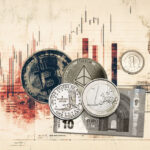
- USD/CHF moves little as traders adopt caution ahead of Swiss Consumer Price Index data.
- SNB officials indicated that interest rates could be pushed into negative territory if downside risks continue to build.
- Traders expect the US Nonfarm Payrolls to increase by 110K in June, against 139K jobs added in May.
USD/CHF retraces its recent gains registered in the previous session, trading around 0.7920 during the Asian hours on Thursday. The pair maintains its position around 0.7872, the lowest since September 2011, recorded on July 1. Traders await Swiss Consumer Price Index (CPI) data to gain further impetus on the Swiss National Bank’s (SNB) policy outlook, due later in the day.
The Swiss National Bank’s (SNB) officials suggested that both negative rates and currency interventions remain on the table. In June, the SNB cut rates to 0% to address easing inflationary pressures and indicated it could push rates into negative territory if downside risks persist.
The Swiss Federal Statistical Office reported on Wednesday that Real Retail Sales remained flat at 0% year-over-year in May, falling short of market expectations of 0.8% and coming in below the previous 0.9% growth. Moreover, the SVME Purchasing Managers’ Index (PMI) improved to 49.6 in June from 42.1 in May. The reading significantly surpassed market expectations of 44.0; however, the index remained below the 50-point expansion level for the 30th consecutive month.
The downside of the USD/CHF pair could be restrained as the US Dollar (USD) extends its gains for the second successive session. The US Dollar Index (DXY), which measures the value of the Greenback against six major currencies, is trading at around 96.80 at the time of writing.
Traders await highly anticipated labor market data, including US Nonfarm Payrolls (NFP) and Average Hourly Earnings, due later in the day. Moreover, ISM Services PMI and S&P Global US PMI will also be eyed on Thursday.
Swiss Franc FAQs
The Swiss Franc (CHF) is Switzerland’s official currency. It is among the top ten most traded currencies globally, reaching volumes that well exceed the size of the Swiss economy. Its value is determined by the broad market sentiment, the country’s economic health or action taken by the Swiss National Bank (SNB), among other factors. Between 2011 and 2015, the Swiss Franc was pegged to the Euro (EUR). The peg was abruptly removed, resulting in a more than 20% increase in the Franc’s value, causing a turmoil in markets. Even though the peg isn’t in force anymore, CHF fortunes tend to be highly correlated with the Euro ones due to the high dependency of the Swiss economy on the neighboring Eurozone.
The Swiss Franc (CHF) is considered a safe-haven asset, or a currency that investors tend to buy in times of market stress. This is due to the perceived status of Switzerland in the world: a stable economy, a strong export sector, big central bank reserves or a longstanding political stance towards neutrality in global conflicts make the country’s currency a good choice for investors fleeing from risks. Turbulent times are likely to strengthen CHF value against other currencies that are seen as more risky to invest in.
The Swiss National Bank (SNB) meets four times a year – once every quarter, less than other major central banks – to decide on monetary policy. The bank aims for an annual inflation rate of less than 2%. When inflation is above target or forecasted to be above target in the foreseeable future, the bank will attempt to tame price growth by raising its policy rate. Higher interest rates are generally positive for the Swiss Franc (CHF) as they lead to higher yields, making the country a more attractive place for investors. On the contrary, lower interest rates tend to weaken CHF.
Macroeconomic data releases in Switzerland are key to assessing the state of the economy and can impact the Swiss Franc’s (CHF) valuation. The Swiss economy is broadly stable, but any sudden change in economic growth, inflation, current account or the central bank’s currency reserves have the potential to trigger moves in CHF. Generally, high economic growth, low unemployment and high confidence are good for CHF. Conversely, if economic data points to weakening momentum, CHF is likely to depreciate.
As a small and open economy, Switzerland is heavily dependent on the health of the neighboring Eurozone economies. The broader European Union is Switzerland’s main economic partner and a key political ally, so macroeconomic and monetary policy stability in the Eurozone is essential for Switzerland and, thus, for the Swiss Franc (CHF). With such dependency, some models suggest that the correlation between the fortunes of the Euro (EUR) and the CHF is more than 90%, or close to perfect.
Information on these pages contains forward-looking statements that involve risks and uncertainties. Markets and instruments profiled on this page are for informational purposes only and should not in any way come across as a recommendation to buy or sell in these assets. You should do your own thorough research before making any investment decisions. FXStreet does not in any way guarantee that this information is free from mistakes, errors, or material misstatements. It also does not guarantee that this information is of a timely nature. Investing in Open Markets involves a great deal of risk, including the loss of all or a portion of your investment, as well as emotional distress. All risks, losses and costs associated with investing, including total loss of principal, are your responsibility. The views and opinions expressed in this article are those of the authors and do not necessarily reflect the official policy or position of FXStreet nor its advertisers. The author will not be held responsible for information that is found at the end of links posted on this page.
If not otherwise explicitly mentioned in the body of the article, at the time of writing, the author has no position in any stock mentioned in this article and no business relationship with any company mentioned. The author has not received compensation for writing this article, other than from FXStreet.
FXStreet and the author do not provide personalized recommendations. The author makes no representations as to the accuracy, completeness, or suitability of this information. FXStreet and the author will not be liable for any errors, omissions or any losses, injuries or damages arising from this information and its display or use. Errors and omissions excepted.
The author and FXStreet are not registered investment advisors and nothing in this article is intended to be investment advice.
Editors’ Picks

EUR/USD consolidates gains near 1.1700 ahead of US data
EUR/USD is consolidating its latest upside near 1.1700 in European trading on Thursday. The US Dollar remains weak across the board as investors stay wary about the future of the Fed’s independence in Trump’s 2.0 era. The focus now shifts toward ECB-speak and mid-tier US data for fresh impetus.

GBP/USD stays firm above 1.3700, near fresh multi-year highs
GBP/USD holds its winning streak for the fourth successive session, trading above 1.3700 in the European session on Thursday. The pair hangs close to three-year highs amid sustained US Dollar weakness, in light of US President Trump’s fresh attack on the Fed’s credibility. US data and BoE-speak awaited.

Gold price retains its positive bias amid a broadly weaker USD; lacks bullish conviction
Gold price trades with a mild positive for the second straight day on Thursday, though it lacks follow-through and remains below the $3,350 level through the early European session. Reports that US President Donald Trump was considering replacing Federal Reserve Chair Jerome Powell raised concerns over the future independence of the US central bank.

Could Iran block the Strait of Hormuz? Why Oil is on edge after US strikes
As the Israel-Iran conflict reaches new heights, an old threat is coming back to haunt the markets: that of the closure of the Strait of Hormuz. This narrow arm of the sea in the Persian Gulf, wedged between Iran to the north and the United Arab Emirates and Oman to the south, is much more than a simple sea passage.

The Best brokers to trade EUR/USD
SPONSORED Discover the top brokers for trading EUR/USD in 2025. Our list features brokers with competitive spreads, fast execution, and powerful platforms. Whether you’re a beginner or an expert, find the right partner to navigate the dynamic Forex market.








